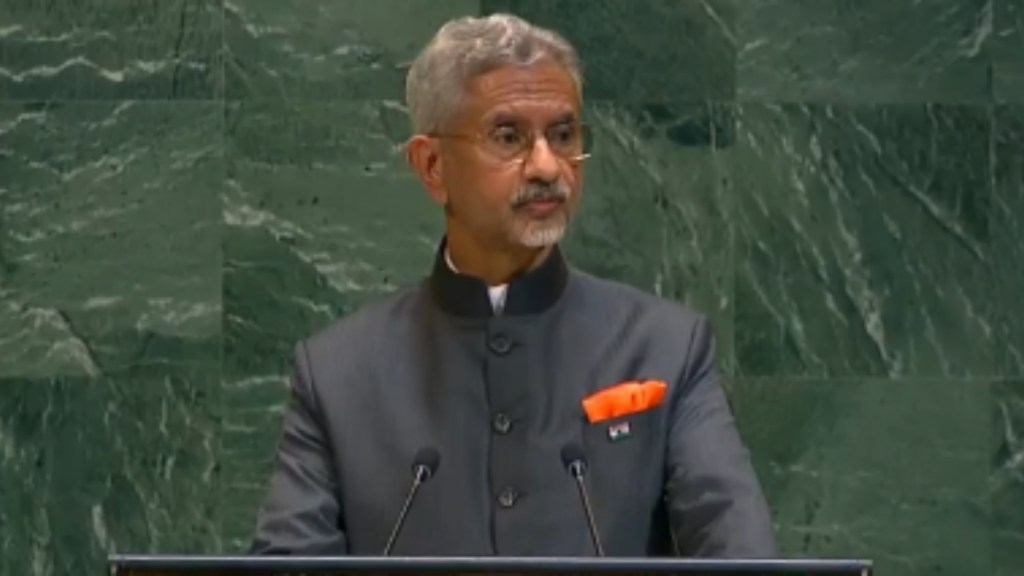India’s External Affairs Minister S. Jaishankar addressed the 80th United Nations General Assembly on Saturday. “Namaskar from the people of Bharat. We are gathered here, eight decades since the founding of this unique body. The UN Charter calls on us not just to prevent war, but to build peace. Not just to defend rights, but to uphold the dignity of every human being,” Jaishankar said as he began the address.
External Affairs Minister S. Jaishankar told the UN General Assembly that the Sustainable Development Goals (SDGs) “present a sorry picture,” adding, “We must ask ourselves, how has the UN lived up to expectation?”
The minister also went on to deliver a critical assessment of UN’ s recent efforts towards resolving military confrontations, conflicts, climate events, and matters of terrorism. Let’s break it down for you:
Jaishankar UNGA speech: Key Highlights
Jaishankar’s scathing attack on ‘neighbour’ Pakistan that is ‘epicentre of terrorism’
The EAM strongly criticised Pakistan during his speech at the 80th UN General Assembly. He said that Pakistan openly treats terrorism as part of its state policy. He pointed out that India has faced this problem since its independence, with Pakistan becoming a hub of global terrorism, and noted that for decades, many of the world’s major terror attacks could be traced back to Pakistan, and that the UN’s lists of designated terrorists include many of its citizens.
“India has confronted this challenge since its independence, having a neighbour that is an epicentre of global terrorism. For decades now, major international terrorist attacks are traced back to that one country. UN’s designated lists of terrorists are replete with its nationals,” he said.
He also mentioned the terror attack in Pahalgam in April this year, where 26 people were killed. He said India acted to protect its people and ensured that those responsible for organising and carrying out the attack were brought to justice.
“Countering terrorism is a particular priority because it synthesises bigotry, violence, tolerance and fear. India has confronted this challenge since Independence, having a neighbour that is the epicentre of terrorism. For decades now, major international terrorist attacks trace back to that one country. UN’s designated list of terrorists are replete with its nationals. The most recent example of cross-border barbarism was the murder of innocent tourists in Pahalgam in April this year,” Jaishankar said in his speech.
Jaishankar urges for global cooperation
Calling for stronger global unity, Jaishankar warned that terrorism thrives on hatred, violence, intolerance, and fear, and must be countered together. “Because terrorism is a shared threat, it is essential that there is much deeper international cooperation,” he said.
He added that countries that promote terrorism as policy, allow terror networks to function at large scale, or glorify terrorists should face clear condemnation. Funding for such groups must be cut off, leading terrorists should be sanctioned, and constant pressure must be applied to dismantle the system that supports them. He also cautioned that nations protecting or ignoring states that sponsor terrorism will eventually face its consequences. “Relentless pressure must be applied on the entire terrorism ecosystem. Those who condone nations that sponsor terror will find that it comes back to bite them,” he said.
Jaishankar added that while defending national rights, countries must also confront these threats directly, making the fight against terrorism a key global priority
‘We now see tariff volatility’: Jaishankar at UNGA
As India faces Trump’s tariffs, Jaishankar also put a spotlight on the growing economic challenges in the world. He said that frequent changes in tariffs and uncertain market access are forcing countries to reduce risks by diversifying supply sources and avoiding over-dependence on a single market. “We now see tariff volatility and uncertain market access. As a result, de-risking is a growing compulsion; whether from limited sources of supply or over-dependence on a particular market,” he said.
He added that economic concerns are also linked to tighter controls on technology, growing competition over supply chains and critical minerals, and sensitive issues around connectivity. “Economic concerns have other dimensions as well. Heightened technology control is one. The grip on supply chains and critical minerals is another. The shaping of connectivity is no less sensitive. Protection of key sea lanes has become a challenge. Restricting the evolution of a global workplace is an issue.
According to Jaishankar, these challenges “make a compelling case for more international cooperation, not less” but he further asked whether the world is moving in that direction and how much of a difference the UN has made so far. “But are we really headed in that direction? And where has the UN actually made a difference?
Jaishankar calls for UNSC expansion, highlights India’s role on global platform
Jaishankar urged urgent reforms in the United Nations Security Council (UNSC), stressing that both permanent and non-permanent seats should be expanded to make it more representative. He said that India is ready to take on greater responsibilities in a reformed Council.
Addressing the 80th UN General Assembly, Jaishankar pointed to India’s role in helping its neighbours during natural disasters and its wider contributions to global peace and stability. He reminded world leaders that India had extended support to Afghanistan and Myanmar after recent earthquakes. “The people of Afghanistan and those of Myanmar saw India extend its hand during recent earthquakes. Our efforts at ensuring safe commerce, combating piracy and preventing attacks on shipping in the northern Arabian Sea also bear mention,” he said in his speech.
Jaishankar highlighted India’s broad engagement worldwide, noting that Indian soldiers contribute to peacekeeping, sailors safeguard maritime routes, security agencies counter terrorism, doctors and teachers promote human development, industries provide affordable goods, technology experts drive digital progress, and training institutions remain open to the world. He said these efforts are at the heart of India’s foreign policy.

